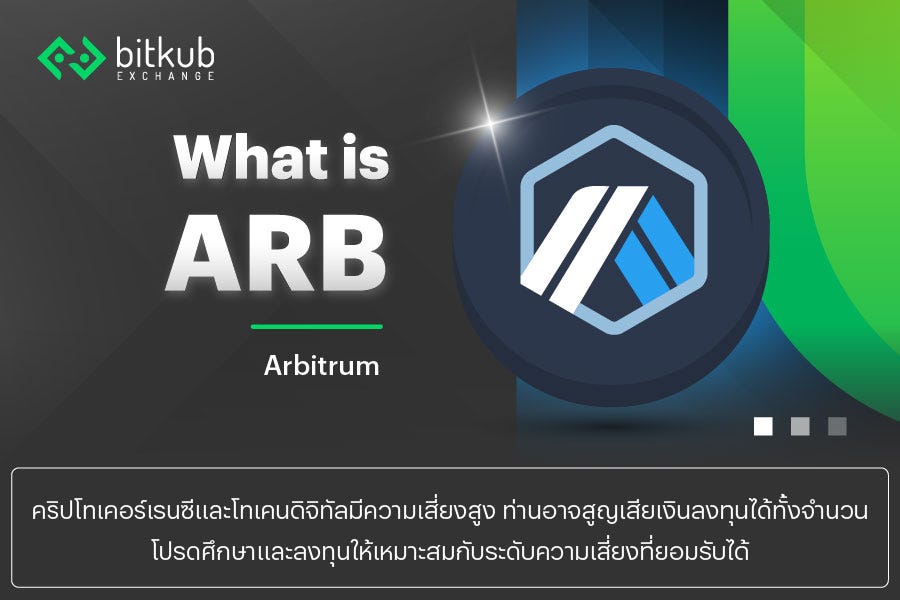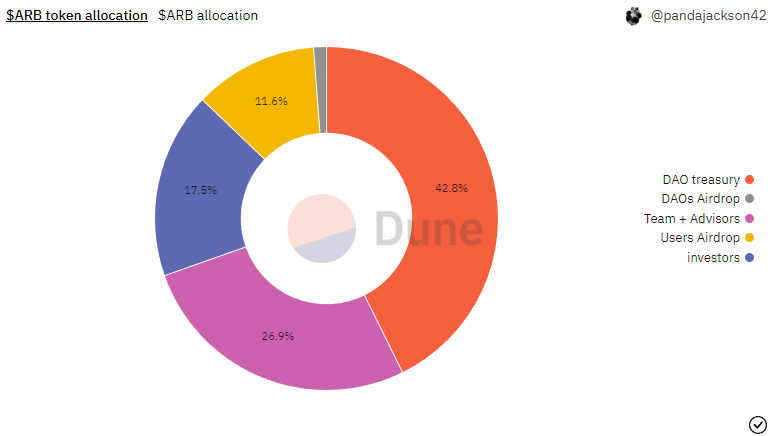Blog
Arbitrum (ARB) คืออะไร รู้จักผู้ช่วยสุดปังของ Ethereum

Ethereum เป็นเครือข่ายแรก ๆ ที่นักพัฒนานึกถึงเมื่อต้องการพัฒนา dApp ทำให้ความนิยมของ Ethereum เติบโตอย่างต่อเนื่อง แต่ก็มีความท้าทายอย่างการปรับขนาดเครือข่าย เพื่อเอาชนะความท้าทายนี้นักพัฒนาได้สร้างโซลูชันเลเยอร์ 2 และหนึ่งในนั้นก็คือ Arbitrum นั่นเอง
ในบทความนี้ Bitkub Blog จะมาสรุปให้ฟังว่า Arbitrum คืออะไร ต่างจาก Layer 2 ตัวอื่นอย่างไร และโทเคน ARB ทำอะไรได้บ้าง มาดูกันครับ
Arbitrum คืออะไร?

Arbitrum เป็นเลเยอร์ 2 (Layer 2) สำหรับบล็อกเชน Ethereum มีจุดมุ่งหมายเพื่อเพิ่มความสามารถในการปรับขนาด (Scalability) และลดค่าธรรมเนียมการทำธุรกรรมของ Ethereum เพื่อเอาชนะข้อจำกัดของเครือข่าย และทำให้มีประสิทธิภาพของเครือข่าย Ethereum โดยรวมสูงขึ้น
เนื่องจากจำนวนแอปพลิเคชันกระจายอำนาจ (dApp) และโปรโตคอลต่าง ๆ ที่เกิดขึ้นอย่างต่อเนื่องบน Ethereum ทำให้เครือข่ายมีปัญหาด้านค่าธรรมเนียมที่สูงและเวลาในการประมวลผลธุรกรรมที่ช้า ซึ่งเป็นปัญหาคอขวดสำหรับการเติบโตของระบบนิเวศ Arbitrum จึงถูกพัฒนาขึ้นมาเพื่อแก้ปัญหาเหล่านี้
หน้าที่ของโทเคน ARB
ARB เป็นโทเคนประจำเครือข่าย Arbitrum และมีหน้าที่หลายอย่างด้วยกันภายในระบบนิเวศของ Arbitrum ดังต่อไปนี้
1.การกำกับดูแล (Governance): ผู้ถือ ARB มีสิทธิ์เข้าร่วมกำกับดูแลและกำหนดทิศทางพัฒนาเครือข่าย Arbitrum ผ่านความสามารถในการเสนอและลงมติเกี่ยวกับการเปลี่ยนแปลงโปรโตคอล เช่น การปรับค่าธรรมเนียม การเลือกผู้ตรวจสอบ และการอัปเกรดระบบ เป็นต้น
2.ค่าธรรมเนียม (Transaction fee): การทำธุรกรรมในเครือข่าย Arbitrum จะใช้ ARB เพื่อชำระค่าธรรมเนียมการทำธุรกรรม หมายความว่าผู้ใช้จำเป็นต้องถือ ARB ไว้ในกระเป๋าเงินเพื่อใช้งาน dApps และโปรโตคอลบนเครือข่าย
3.วางค้ำประกัน (Staking): ผู้ถือ ARB สามารถนำโทเคนไปวางค้ำประกันเพื่อเป็นผู้ตรวจสอบในเครือข่าย (Validator) โดยจะได้รับหน้าที่ประมวลผลธุรกรรม ดูแลเครือข่าย และรักษาความปลอดภัย ผู้ตรวจสอบที่ทำตามหน้าที่ได้อย่างถูกต้องและสุจริตก็จะได้รับรางวัลเป็นโทเคน ARB
4.สภาพคล่อง (Liquidity): ARB สามารถใช้เป็นสื่อกลางในการแลกเปลี่ยนและซื้อขายคริปโทเคอร์เรนซีสกุลต่าง ๆ ผ่านแอปพลิเคชันบนเครือข่ายได้
จุดเด่นของ Arbitrum
เครือข่าย Arbitrum จะทำหน้าที่รวมธุรกรรมหลายรายการเป็นธุรกรรมเดียวแล้วส่งไปยังบล็อกเชน Ethereum เพื่อช่วยลดภาระของเครือข่าย Ethereum และเพิ่มความสามารถในการปรับขนาด
คุณสมบัติที่เป็นเอกลักษณ์อย่างหนึ่งของ Arbitrum คือมีระบบนิเวศสัญญาอัจฉริยะ (Smart contract) ที่มีคุณสมบัติครบถ้วน และสามารถเข้ากันได้กับ Ethereum หมายความว่านักพัฒนาสามารถใช้สัญญา Ethereum ที่มีอยู่บนเครือข่าย Arbitrum ได้โดยไม่ต้องแก้ไขใด ๆ ทำให้ง่ายสำหรับนักพัฒนาในการย้าย dApps และ DeFi ไปยัง Arbitrum ซึ่งจะช่วยลดภาระของ Ethereum ลงไปได้อีก
Arbitrum ใช้เทคโนโลยี Optimistic Rollup ที่ช่วยให้สามารถทำธุรกรรมได้อย่างรวดเร็วและราคาถูกโดยไม่กระทบต่อความปลอดภัย ภายใต้ระบบนี้ ธุรกรรมจะถูกประมวลผลนอกเครือข่ายและส่งไปยัง Ethereum เป็นชุด โดยระบบจะถือว่าธุรกรรมทั้งหมดถูกต้อง เว้นแต่จะมีรายงานการฉ้อโกงเข้ามาจึงค่อยตรวจสอบความถูกต้อง สิ่งนี้ทำให้ Arbitrum สามารถเพิ่มความเร็วในการทำธุรกรรมพร้อมกับรักษาความปลอดภัยของเครือข่าย Ethereum ได้
นอกจากนี้ เครือข่าย Arbitrum ยังได้รับการออกแบบมาให้ใช้งานง่าย โดยมี User Interface ที่เรียบง่าย ทุกคนสามารถเข้าถึงได้แม้ไม่มีความเชี่ยวชาญทางเทคนิคก็ตาม ผู้ใช้สามารถใช้งานเครือข่าย Arbitrum โดยใช้ใช้ที่อยู่และ Private Key ตัวเดียวกันกับที่ใช้ในเครือข่าย Ethereum
Arbitrum ได้รับความสนใจอย่างมากจากชุมชน Ethereum และนักพัฒนาจำนวนมากกำลังสำรวจศักยภาพของมัน Arbitrum มีศักยภาพในการพัฒนาความสามารถในการขยายขนาดอย่างมีนัยสำคัญและลดค่าธรรมเนียมการทำธุรกรรมของเครือข่าย Ethereum ซึ่งจะเป็นการปลดล็อกศักยภาพของแอปพลิเคชันแบบกระจายศูนย์ได้อย่างเต็มที่
ใครเป็นคนสร้าง Arbitrum?

Arbitrum ถูกสร้างขึ้นโดย Offchain Labs ซึ่งเป็นบริษัทวิจัยและพัฒนาบล็อกเชนที่ก่อตั้งโดย Ed Felten, Steven Goldfeder และ Harry Kalodner พวกเขาร่วมกันก่อตั้ง Offchain Labs ในปี 2018 และเริ่มพัฒนา Arbitrum
Ed Felten เป็นศาสตราจารย์ด้านวิทยาการคอมพิวเตอร์และกิจการสาธารณะที่ Princeton University และเป็นอดีตรองประธานเจ้าหน้าที่ฝ่ายเทคโนโลยี (CTO) ของสหรัฐอเมริกาภายใต้ประธานาธิบดี Obama
Steven Goldfeder เป็นนักศึกษาดุษฎีบัณฑิต (Ph.D. Candidate) สาขาวิทยาการคอมพิวเตอร์ระดับปริญญาเอกที่ Princeton University
และ Harry Kalodner เป็นนักศึกษาดุษฎีบัณฑิตสาขาวิทยาการคอมพิวเตอร์ระดับปริญญาเอกที่มหาวิทยาลัย Maryland
ARB มีการกระจายโทเคนอย่างไร?
โทเคน ARB เริ่มถูกแจกจ่ายไปเมื่อวันที่ 23 มีนาคม 2023 โดยแจกจ่ายออกไป 12.75% ของจำนวนโทเคนทั้งหมดให้กับผู้รับและ DAO ที่มีสิทธิ์
อุปทานทั้งหมดของโทเคน ARB ถูกจำกัดไว้ที่ 1 หมื่นล้านเหรียญ โดยมีการกระจายโทเคนออกไปเป็นสัดส่วนดังนี้

42.78% (4.278 พันล้าน): คลัง Arbitrum DAO
26.94% (2.694 พันล้าน): ทีม Offchain Labs และที่ปรึกษา
17.53% (1.753 พันล้าน) นักลงทุน
11.62% (1.162 พันล้าน) Airdrop ไปยังผู้ใช้
1.13% (113 ล้าน): Airdrop ไปยัง DAO
สรุป
Arbitrum เป็นโซลูชันการปรับขนาดเลเยอร์ 2 สำหรับ Ethereum ถูกสร้างขึ้นโดย Offchain Labs เพื่อปรับปรุงความสามารถในการปรับขนาดและลดค่าธรรมเนียมการทำธุรกรรมของ Ethereum มีจุดเด่นอินเทอร์เฟซที่ใช้งานง่ายและสภาพแวดล้อมสัญญาอัจฉริยะที่มีคุณสมบัติครบถ้วน ทำให้ Arbitrum เป็นอีก Layer 2 ที่น่าสนใจที่สุดอีกตัวหนึ่ง
อ้างอิง Alchemy, Blockchain Council, Capital
_________________________________________
มาเรียนรู้เรื่อง บิตคอยน์ (Bitcoin) และ Cryptocurrency ที่จะช่วยให้คุณเข้าใจโลกของคริปโทฯ ได้ดีขึ้น ที่ Bitkub Blog
หากคุณยังเป็นมือใหม่ ค้นหาข้อมูลเพิ่มเติมได้ในบทความ “แหล่งความรู้ มือใหม่หัดเทรดคริปโต เริ่มต้นที่นี่”
*คริปโทเคอร์เรนซีและโทเคนดิจิทัลมีความเสี่ยงสูง ท่านอาจสูญเสียเงินลงทุนได้ทั้งจํานวน โปรดศึกษาและลงทุนให้เหมาะสมกับระดับความเสี่ยงที่ยอมรับได้
**สินทรัพย์ดิจิทัลมีความเสี่ยง โปรดศึกษาและลงทุนให้เหมาะสมกับระดับความเสี่ยงที่ยอมรับได้
***ผลตอบแทนของสินทรัพย์ดิจิทัลในอดีตหรือผลการดําเนินงานในอดีต มิได้เป็นสิ่งยืนยันถึงผลตอบแทน ของสินทรัพย์ดิจิทัลหรือผลการดําเนินงานในอนาคต”
_________________________________________
ติดตามบทความที่น่าสนใจได้ที่นี่:
รู้จักกับ Ethereum สกุลเงินดิจิทัลอันดับ 2 ของโลก
Smart Contract คืออะไร?
ทำความรู้จักกับ DApps ที่น่าสนใจ
___________________________________
คำเตือน:
*คริปโทเคอร์เรนซีและโทเคนดิจิทัลมีความเสี่ยงสูง ท่านอาจสูญเสียเงินลงทุนได้ทั้งจํานวน โปรดศึกษาและลงทุนให้เหมาะสมกับระดับความเสี่ยงที่ยอมรับได้
**สินทรัพย์ดิจิทัลมีความเสี่ยง โปรดศึกษาและลงทุนให้เหมาะสมกับระดับความเสี่ยงที่ยอมรับได้
***ผลตอบแทนของสินทรัพย์ดิจิทัลในอดีตหรือผลการดําเนินงานในอดีต มิได้เป็นสิ่งยืนยันถึงผลตอบแทน ของสินทรัพย์ดิจิทัลหรือผลการดําเนินงานในอนาคต
___________________________________
What is Arbitrum: A Guide to Ethereum’s Layer 2 Scaling Solution
Ethereum has become a hub for decentralized applications and finance (DeFi) protocols. However, with its growing popularity comes challenges such as scalability and high transaction fees. To overcome these challenges, developers have created Layer 2 solutions that operate on top of the Ethereum network. One such solution is Arbitrum.
What is Arbitrum?

Arbitrum is a Layer 2 scaling solution for Ethereum that aims to improve the scalability and reduce the transaction fees of the Ethereum blockchain. It is an innovative technology that has been developed to overcome the limitations of the Ethereum network and make it more efficient.
The Ethereum network has been struggling to keep up with the growing demand for decentralized applications (dApps) and decentralized finance (DeFi) protocols. The high transaction fees and slow transaction processing times have become a bottleneck for the growth of the Ethereum ecosystem. This is where Arbitrum comes in.
What are the purposes of ARB?
ARB is the native token of the Arbitrum network, and it serves several purposes within the ecosystem. Here are some of the primary purposes of ARB:
1.Governance: ARB holders have the right to participate in the governance of the Arbitrum network. This includes the ability to propose and vote on changes to the protocol, such as fee adjustments, validator elections, and upgrades to the system.
2.Transaction Fees: ARB is used to pay for transaction fees on the Arbitrum network. This means that users need to hold ARB in their wallets to interact with dApps and protocols on the network.
3.Staking: ARB can be staked to become a validator on the Arbitrum network. Validators are responsible for processing transactions, maintaining the network, and securing the system. Validators are incentivized to perform their duties correctly, as they earn rewards in ARB for their contributions to the network.
4.Liquidity: ARB can be used as a medium of exchange and traded on various cryptocurrency exchanges. This provides liquidity to the token and makes it easy for users to acquire or dispose of ARB as needed.
What make Arbitrum unique?
Arbitrum is a rollup solution that operates on top of the Ethereum blockchain. It works by aggregating multiple transactions into a single transaction and then submitting it to the Ethereum blockchain. This helps to reduce the load on the Ethereum network and improve its scalability.
One of the unique features of Arbitrum is that it offers a full-featured smart contract environment that is compatible with Ethereum. This means that developers can deploy their existing Ethereum contracts on the Arbitrum network without any modifications. This makes it easy for developers to migrate their dApps and DeFi protocols to Arbitrum, thereby reducing the load on the Ethereum network.
Arbitrum uses a technology called Optimistic Rollup, which allows it to provide fast and cheap transactions without compromising on security. In this system, transactions are processed off-chain and then submitted to the Ethereum blockchain in batches. The system assumes that all the transactions are valid and then uses fraud proofs to verify their validity. This allows it to achieve fast transaction speeds while maintaining the security of the Ethereum network.
The Arbitrum network has been designed to be user-friendly and easy to use. It offers a simple user interface that is accessible to everyone, regardless of their technical expertise. Users can interact with the Arbitrum network using popular wallets like MetaMask, and they can also use the same Ethereum addresses and private keys that they use on the Ethereum network.
Arbitrum has gained a lot of attention from the Ethereum community, and many developers are already exploring its potential. It has the potential to significantly improve the scalability and reduce the transaction fees of the Ethereum network, thereby unlocking the full potential of decentralized applications and decentralized finance protocols.
Who creates Arbitrum?

Arbitrum was created by Offchain Labs, which is a blockchain research and development company founded by Ed Felten, Steven Goldfeder, and Harry Kalodner. Together, they founded Offchain Labs in 2018 and developed Arbitrum as their flagship product.
Ed Felten is a professor of computer science and public affairs at Princeton University and is a former Deputy U.S. Chief Technology Officer under President Obama.
Steven Goldfeder is a computer science Ph.D. candidate at Princeton University.
Harry Kalodner is a computer science Ph.D. candidate at the University of Maryland.
How are ARB Allocated?
ARB is the native governance token of Arbitrum. It will launch on March 23rd 2023, distributing 12.75% of the total supply of ARB tokens to eligible recipients and DAOs.
The total supply of ARB tokens is fixed at 10 billion. The token allocation is as follows:

42.78% (4.278 billion): Arbitrum DAO treasury
26.94% (2.694 billion): Offchain Labs teams and advisors
17.53% (1.753 billion): Investors
11.62% (1.162 billion): Airdrop to users
1.13% (113 million): Airdrop to DAOs
Conclusion
In conclusion, Arbitrum is a Layer 2 scaling solution for Ethereum developed by Offchain Labs that aims to improve the scalability and reduce the transaction fees of the Ethereum blockchain. With its user-friendly interface and full-featured smart contract environment, Arbitrum is poised to become one of the most popular Layer 2 solutions for Ethereum in the coming years.
Reference: Alchemy, Blockchain Council, Capital
_________________________________________
Let’s learn about the world of crypto at Bitkub Blog and if you are a beginner. Find out more in the article.
- Cryptocurrency and digital tokens involve high risks; investors may lose all investment money and should study information carefully and make investments according to their own risk profile.
- Digital assets involve risks; investors should study information carefully and make investments according to their own risk profile.
- Returns/Past Performance does not guarantee future returns/performance.
Source:
Medium